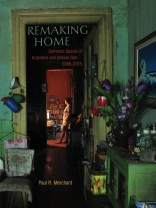Houses, in the Argentine and Chilean films of the early twenty-first century, provide much more than a backdrop to on-screen drama. Nor are they simply refuges from political turmoil or spaces of oppression. <i>Remaking Home</i> argues that domestic spaces are instead the medium through which new, fragile common identities are constructed. The varied documentary and fiction films analyzed here, which include an early work by Oscar winner Sebastián Lelio, use the domestic sphere as a laboratory in which to experiment with narrative, audiovisual techniques, and social configurations. Where previous scholarship has focused on the social fragmentation and political disillusionment visible in contemporary film, <i>Remaking Home</i> argues that in order to understand the political agency of contemporary cinema, it is necessary to move beyond deconstructive critical approaches to Latin American culture. In doing so, it expands the theoretical scope of studies in Latin American cinema by finding new points of contact between the cultural critique of Nelly Richard, the work of Bruno Latour, and theories of new materialism.
เกี่ยวกับผู้แต่ง
<b>Paul R. Merchant </b>is lecturer in Latin American film and visual culture at the University of Bristol. He is the coeditor, with Lucy Bollington, of <i>Latin American Culture and the Limits of the Human</i>.<b></b>












